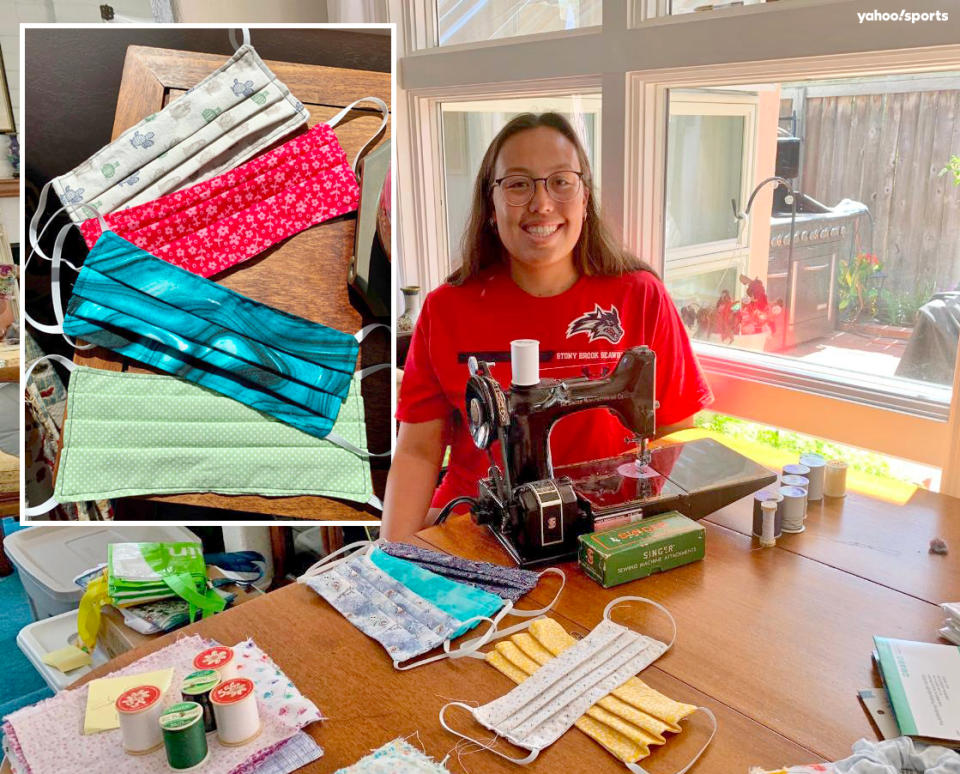Homer Hankies, old uniforms: How the sports world is helping to supply coronavirus masks
Amid a nationwide shortage of masks needed to combat the spread of COVID-19, a Minnesota Twins executive pondered a wacky idea.
Mitch Retelny wondered, “Could we turn Homer Hankies into face masks?”
The Twins had a surplus of 25,000 unused Homer Hankies because of the brevity of their 2019 playoff run. Boxes of those unused red giveaway towels went into storage after the Yankees swept the Twins out of the playoffs in three games.
For months, Retelny thought about what to do with the extra Homer Hankies. By the end of March, he still hadn't yet dreamed up a promotional event where they would be a fitting giveaway.
Finally, as the pandemic swept the nation and medical supplies became more scarce, Retelny wondered if there was a better option. He began to explore repurposing the Homer Hankies to provide masks for those in need.
Teaming with Minneapolis companies Love Your Melon and Faribault Woolen Mill Co., the Twins will turn their excess Homer Hankies into face coverings and donate them to healthcare systems, grocery workers and other nonprofits. One cotton, terrycloth Homer Hanky can be made into up to five masks. Polypropylene surgical wrap will line each mask, providing extra defense against airborne droplets.
"Everyone with the Twins was looking for ways to help our community," said Retelny, the team's senior manager of special events and promotions. “There’s a critical need to provide those bravely working on the front lines of this crisis with high-quality face masks, so it started from there."
Retelny’s ingenuity reflects the eagerness of the sports world to help with the medical supply shortage during the coronavirus crisis.

In Florida alone this month, three professional teams have donated masks to medical facilities and others in need. The Miami Heat partnered with an apparel company earlier this month to turn $100,000 of unsold jerseys and T-shirts into more than 7,000 masks. The Miami Marlins made a similar donation of masks fashioned from nearly 1,000 jerseys, uniform pants and T-shirts. The Jacksonville Jaguars purchased 45,000 team-branded masks and distributed them in the Jacksonville area.
Elsewhere, other teams have done the same. Colts owner Jim Irsay said earlier this month that he obtained 10,000 N95 respiratory masks and plans to donate them to the Indiana State Department of Health. The Giants, 49ers, Warriors and other Bay Area franchises announced Friday that they are partnering with a bag manufacturer to turn more than 10,000 T-shirts into 50,000 masks and bandanas.
But it isn’t just well-known professional franchises that are providing desperately needed masks. Athletes who want to make a difference in their communities are also helping too.
Stony Brook University swimmer Sara Chin enjoyed making scrunchies and tote bags when she was in high school. She is now using the sewing skills and leftover fabric from that hobby to create more than 300 masks from the living room of her parents’ home in Huntington Beach, California.
The daughter of an ER doctor and a pediatric dietician, Chin began making masks last month when her parents told her about the shortage at their hospitals. The first masks Chin made went to hospital staff who did not have direct contact with patients or to doctors and nurses who wanted to put them over their N95 masks to lengthen their mask’s lifespan.
As word of Chin’s sewing skills has spread, neighbors have donated spare fabric or unwanted T-shirts and asked her to make masks out of them. That has allowed Chin to provide masks for elderly neighbors and colleagues at the grocery store where she works.
“This was an important cause to me since both my parents work in healthcare,” Chin said. “It’s something so minimal, but it’s helping a lot of people. That’s really nice to be able to do at a time like this.”
Whereas Chin has her living room assembly line, the Twins have partners who can provide labor and expertise in mass production. Retelny expects Faribault Woolen Mill Co. and Love Your Melon to help the Twins create 10,000 masks in the next few days. The partners could team up again to make thousands more in the coming weeks.
The primary purpose of the Homer Hanky masks is helping those in need, but Retelny admits they could be a fun collector’s item for any Twins fans who receive them. The Homer Hanky has been a staple of every Twins playoff appearance since their 1987 World Series run.
“The Homer Hanky is something that’s synonymous with the Twins and tied to Twins history,” Retelny said. “It’s definitely a unique piece.”
More from Yahoo Sports:
First round NFL draft grades: See how your team fared



